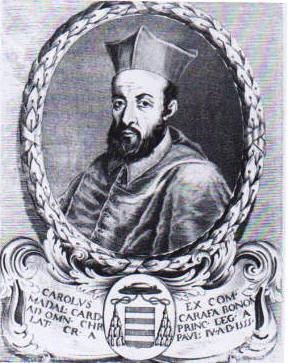 |
| Cardinal Carlo Carafa |
5 March 1561 and the executioner’s axe falls on the neck of the Giovanni Carafa, the Duke of Paliano, nephew of Pope Paul IV.
The day before, the duke’s brother, Cardinal Carlo Carafa, suffers a similar fate, though spared the bloody axe because of the dignity accorded to his holy office. For Carlo death is administered by suffocation, much to the relief of the servants, spared the messy job of mopping up afterwards. So, after reciting the seven psalms of penitence, the cardinal is garrotted.
Thus ended the lives of the Carafa brothers, who just two years earlier had been among the most powerful men in the Vatican, thanks to benevolence of their uncle, Pope Paul IV.
| Pope Paul IV 'Even if my father were a heretic, I would gather the wood myself to burn him'. |
'It is an heretic that makes the fire, Not she which burns in't'. [William Shakespeare]
The Carafa family was one of the most powerful in Naples, and in 1555, one of its members, Cardinal Giovanni Pietro Carafa, was elected pope under the name of Paul IV.
A man lacking in charisma, for several years he had overseen the Inquisition. And on his election to the papacy he issued a bull obliging Jews to live in ghettos; ordered the burning alive of marranos who had fled from Portugal; and instituted the Congregation of the Index Expurgations with the task ‘to examine books and manuscripts intended for publication and to decide whether the people may be permitted to read them’ (aka book censorship).
He also invoked the ancient tradition of papal nepotism by making his first nephew (Carlo) a cardinal and then his Secretary of his State, his second nephew (Giovanni) commander of the Papal guard, and his third nephew (Antonio) the Marquis of Montebello.
nepotism - the practice among the powerful of granting favours to relatives or friends, especially in giving them jobs. From Italian nepotismo, from nipote (nephew), with reference to privileges bestowed on the 'nephews' of popes.
Then events take a new dramatic turn. Ten days after the pope's death, while the cardinals are agonising over the naming of his successor, Giovanni orders the assassination of Marcello Capece, the supposed lover of his wife, the magnificently named Violante Diaz Garlon. The new pope when elected, Pious IV, orders the arrest of Giovanni and his brother Carlo, along with their accomplices.
The two brothers are condemned to death for heresy and homicide and the sentence is carried out. But in 1567, the surviving brother, Antonio, petitions the pope to re-examine the trial of Carlo and Giovanni. The pope agrees, and after several months of examination, rehabilitates the brothers. And for good measure he makes Antonio a cardinal.



No comments:
Post a Comment